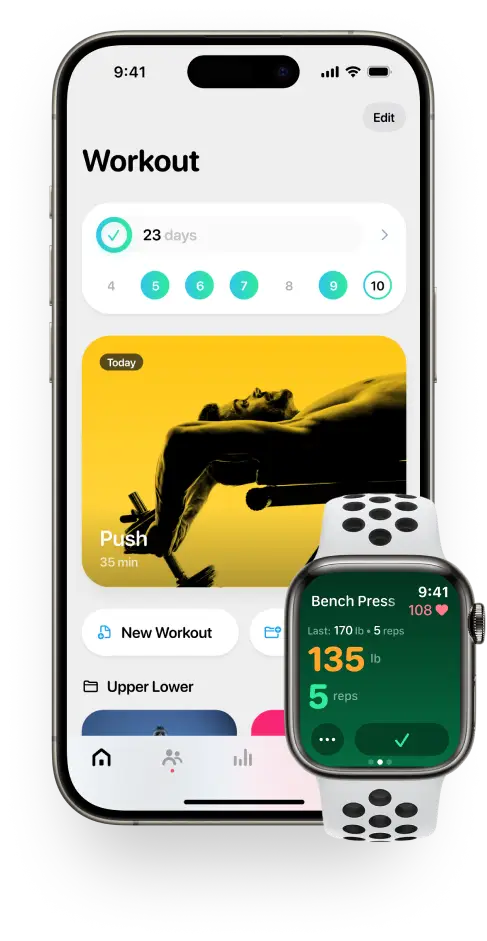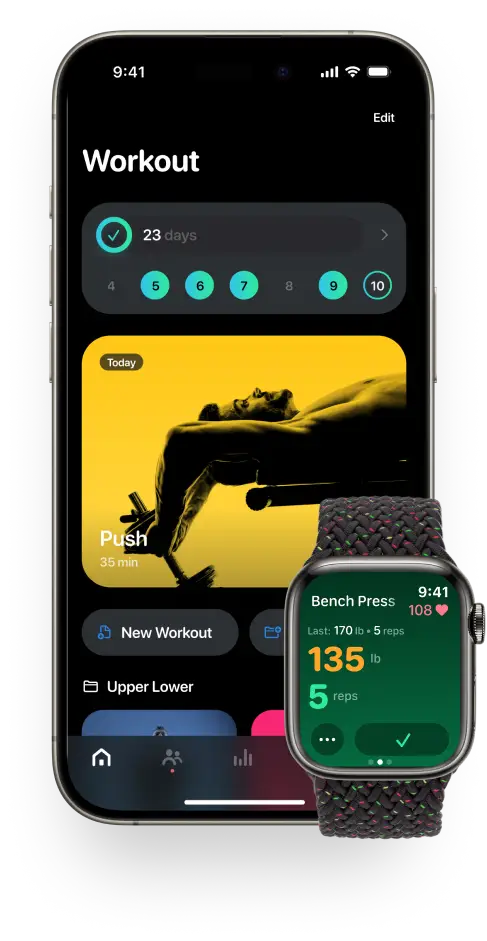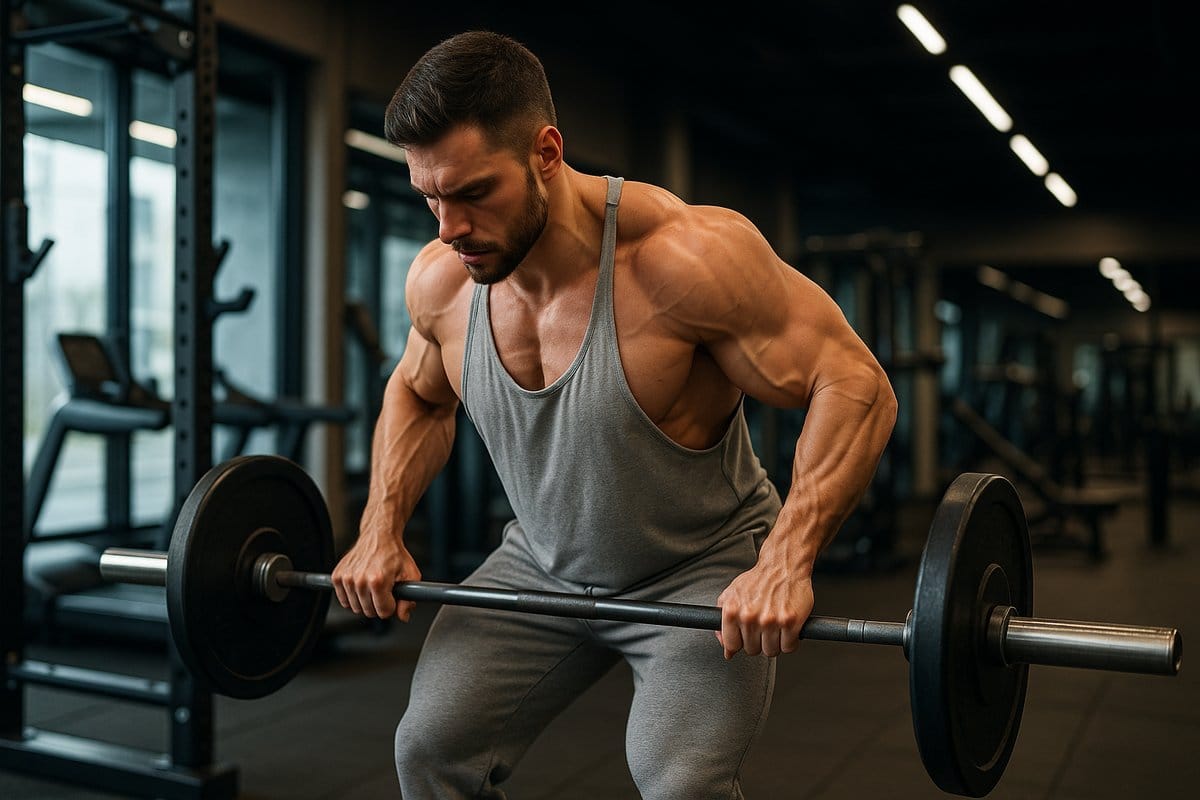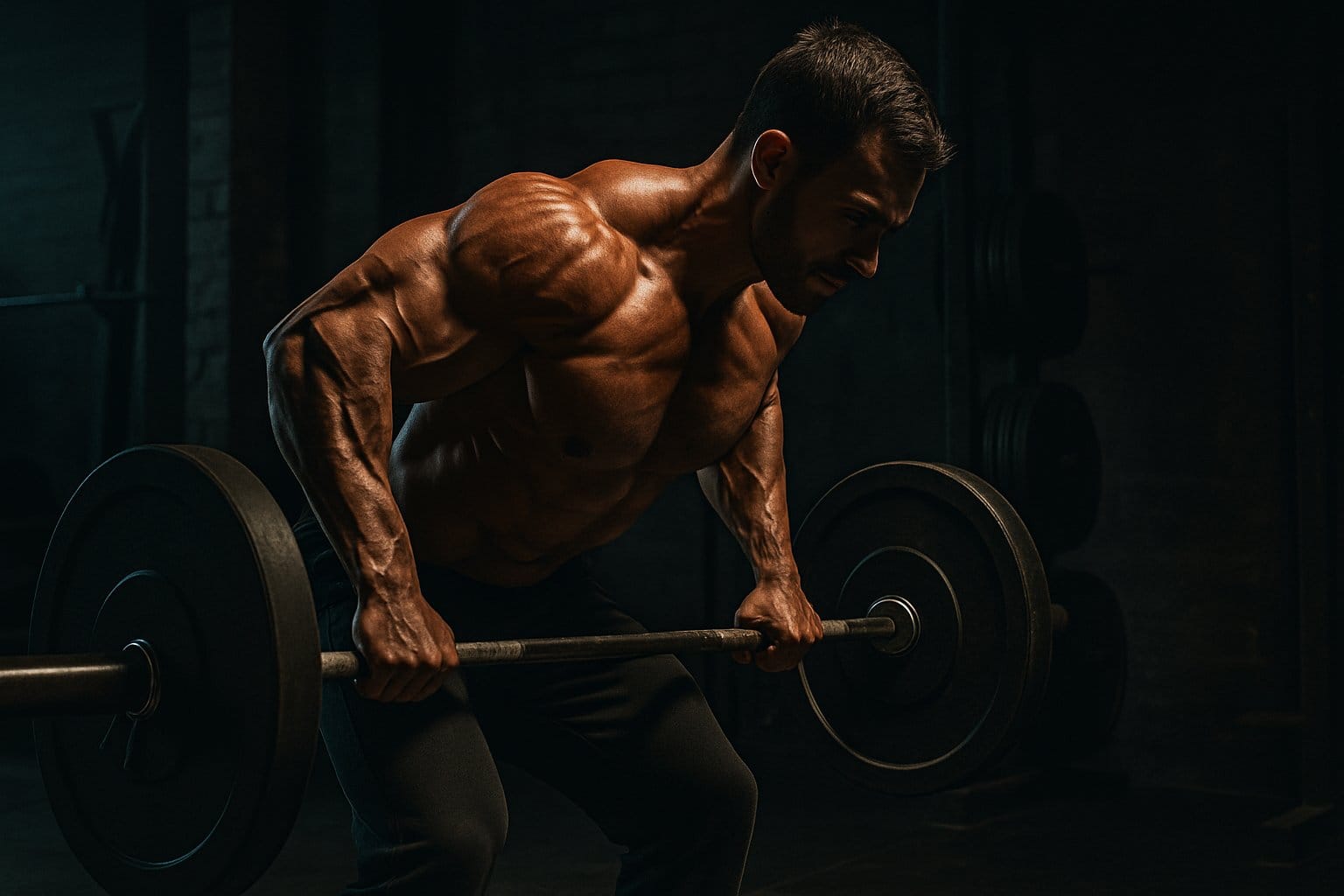How Many Calories Do Push-Ups Burn?
This guide will tell you how many calories push-ups burn. Learn which factors influence your calorie burn and how to burn more.
As you grow on your fitness journey, your goals will change and evolve.
One thing that many fitness newbies turned enthusiasts aim to work on is mastering the perfect push-up. If you’re someone who can crank out hundreds of push-ups, they may feel second nature to you.
You’re probably not thinking about refining your push-up technique. Or even about push-up particulars, like how many calories push-ups burn.
Why Are Push-Ups So Good for You?
Push-ups are the perfect move to get in a total body workout that challenges your muscles.
Several reasons inform how this simple exercise is effective for giving you a stronger body.
Push-up variations also work into any discipline or type of workout you can think of. We use push-ups in workouts from CrossFit to yoga. This is because their tried and true benefits can give solid results to any type of athlete.
Look at just a few of the benefits you can get from performing push-ups regularly.
Joint Health
Push-ups put the work into your shoulder and elbow joints. You do need to be cautious not to injure your shoulders or elbows doing this move. But increasing your strength is a great weight-bearing exercise to strengthen your joints.
Upper Body Strength
Push-ups are a great way to improve your upper body strength. If you notice that you have weak arms, consistent push-ups are a way to get strong fast.
You probably don’t want to be doing 500 push-ups a day. But doing a simple 3 sets of 10 on days you go to the gym can build your strength surprisingly quickly.
Aesthetics
Push-ups can also be a great aesthetic workout. Do you HAVE to use weight training to get bigger muscles and look good?
Nope. Push-ups can be just as effective at getting you to that lean-yet-bulky look that you want.
In fact, according to research from the Journal of Exercise Science and Fitness, low-load bench press and push-up induce similar muscle hypertrophy and strength gain.
Push-ups are just as good a move as any to give you jacked pecs, a Greek God body and a coveted V-line.
You may even be able to work around bad shoulder genetics with your push-ups to get a sexy “boulder shoulder” look.
Heart Health
When you do break into the cardiovascular zone and get your heart pumping with your push-ups, it’s a good indicator that your heart is healthy!
A study on the association between push-up exercise capacity and future cardiovascular events among active adult men found that middle-aged men who could do over 40 push-ups had significantly fewer heart health risks than those who couldn’t.
Push-up capacity was even more closely associated with a lower risk of heart health issues than cardiovascular capacity. Researchers tested this with treadmill training– an aerobic workout.
Reduces Inflammation
Bodyweight training may reduce chronic inflammation, according to a study published by the journal Sports.
This research focused on how bodyweight training can be a cost-effective and simple way for older adults to train. In aging populations, there’s good evidence to show that bodyweight training is highly effective.
Reducing inflammation is a good way to ward off diseases like cancer, Alzheimers and hypertension.
Push-Up Muscles Worked
What muscles do push-ups work?
This total-body compound exercise targets multiple muscle groups. This includes your:
Triceps
These muscles on the backs of your arms help to drive your body upwards from the bottom of your push-ups. Make sure your triceps are rotating inward and anchored against the sides of your trunk. This will help you make sure the work stays focused on your arms.
Chest
Your pectoral muscles (chest) help control your speed and resistance while you lower your body down and raise it during a push-up.
If you do a couple of push-up reps, you’ll probably feel your chest get sore first. This is because it’s one of the primary muscles that you engage when you work on your push-ups.
Shoulders
The deltoid muscles in your shoulders control your body’s stability when helping you resist your body weight in a push-up.
Abdominals
The core muscles (your abdominals) help you keep your alignment in a push-up. To do proper push-ups, make sure your hips don’t sag downwards or hike up to throw your body out of position.
Making sure to engage your core not only helps you hold your form but can prevent the spine from bending too much to cause back pain.
Why Are Push-Ups So Hard?
People often wonder why compound bodyweight moves like push-ups and pull-ups are so hard.
Part of the challenge that comes with doing push-ups is because this move works the whole body at once.
A full push-up works major muscle groups including the shoulders, chest, legs and abdominal muscles.
If you compare them to other types of isolation moves, push-ups work many more muscles than most.
This makes them a lot more difficult than other exercises beginners do at the gym.
On top of this, push-ups require you to lift around 60% of your body weight. They're not quite as intense as pull-ups, which require you to lift 100% of your body weight. But push-ups still pack quite the punch for heavy weight.
The heavier you are, the more challenging your push-ups will be since you are lifting more weight.
How to Do Proper Push-Ups
Whether you want a little refresher on your technique or you’re doing your first perfect push-ups, here’s the rundown on how to master expert push-ups.
- Set-Up: Begin in a plank. Keep your hands slightly wider than shoulder-width apart. Try to rotate your upper arms inward. This helps keep your triceps engaged.
- Body Position: Keep your arms straight and your hands aligned with your shoulders. Make sure your body is straight from head to feet.
- Action: Engage your core muscles to keep yourself stable. Slowly lower your body down, bending through your elbows. Make sure to hold your elbows close to your body and don’t flare them outward. Keep lowering your body until your chest is just above the ground or your arms form a 90-degree angle.
- Reverse: Push through your hands to straighten your elbows and lift yourself back up. As you return to the starting position, make sure you form a straight line with your body. Don’t arch your back or hike your hips up too high.
- Reps: Keep going for as many reps as you need. We recommend 3-4 sets of 10 reps for beginners.
Pro-Tip
Keep your neck aligned with your spine by looking slightly ahead, not up or down. Don’t lock out your elbows at the top of your push-up. This will help you avoid shoulder and elbow injuries plus keep more time under tension.
If you find yourself simply dropping your body toward the ground or sagging your hips, there’s a good chance you’re not ready for full push-ups yet.
Fortunately for you, we’ve got a couple of push-up progression moves you can try. Let’s review some push-up variations.
Push-Up Variations and Alternatives
For true newbies, even just one proper push-up can feel like a challenge.
You can take some of the work out of this tough move by doing it on your knees or against a wall. This is a great way to modify your push-ups.
Knee Push-Ups
- Set-Up: Come to a plank position kneeling instead of supporting yourself on your feet. Cross your ankles so your lower legs don’t get in the way.
- Action: Repeat the push-up movement described above. Make sure to keep your body straight in this variation too.
Wall Push-Ups
These principles apply to wall push-ups too! In this variation, you simply perform the push-up motion with both hands planted against a wall.
As you make progress, bring your hands down the wall. Your body will slowly come to a horizontal position like the stance you’re in during a traditional push-up.
Once you get more advanced, you can also try different variations like wide-grip, close-grip, or decline push-ups. These target different muscle groups..

How Many Calories Do Push-Ups Burn?
The number of calories you burn doing push-ups depends on several factors. These include:
Range of Motion
How many calories you burn doing any exercise can depend on the intensity of your movement. If you’re working on your push-ups at an optimal range of motion
Variation
Although traditional push-ups can be a fantastic way to burn extra calories and keep unwanted body fat at bay, other push-up variations may be more effective to get your heart rate up.
Alternative push-ups like plyometric push-ups or Superman push-ups, for example, force you to “explode” into the movements.
In other words, during a set, you need to use your strength to propel your body off the ground, making these plyometric exercises.
Body Weight
People who weigh more will burn more than people who weigh less. To move a larger body takes more energy expenditure than to move a smaller one.
Because of this, you will burn more calories if you are heavier and doing any exercise, not just push-ups.
To guess how many calories you might burn by weight in calisthenics exercises, let’s turn to a Harvard study from 2021.
This article explored how many calories people could burn doing specific exercises. You can read it here: Calories burned in 30 minutes for people of three different weights.
Push-ups fall under the calisthenics exercise category. This refers to any workout that primarily uses body weight.
The Harvard study found that during a moderate-intensity calisthenics workout, on average:
- A 125-pound person burns 135 calories
- A 155-pound person burns 162 calories
- A 185-pound person burns 189 calories
Once athletes upped this exercise to “vigorous-intensity,” calisthetics workouts burned anywhere from 240 calories (125-pound person) to 336 calories (185-pound person).
Of course, your calorie burn by weight depends on multiple factors combined with weight.
Genetics
Your genes can determine how quickly or how slowly your metabolism functions. You inherit many aspects of metabolism.
Think about something like your body type. We inherit a lot of our body weight genes from our parents. Even likelihood of getting cardiovascular disease can be genetic.
In fact, twin studies show that between 31-90% of body mass index (BMI) variable factors are genetic.
You can read more about it here: Associations between genetic variants associated with body mass index.
Your body's muscle-fat ratio and composition can play a major role in how efficiently your metabolism works. People with higher lean muscle mass vs. fat often have more efficient processes of metabolism.
This can contribute to how quickly you’re able to lose weight and burn calories during your workouts.
Speed
How quickly you do your push-ups will impact how many calories you burn. You will burn more calories if you are doing fast reps and working up a sweat.
Slow and sustained workouts that don’t tap into cardio output as much tend to burn fewer calories.
The Takeaway
Push-ups are a great functional exercise to practice for the human body. Several different factors at play impact the number of calories you burn during push-ups or any other type of physical activity.
Because there are so many elements at play here, there’s no perfect formula to determine how many calories you burn doing push-ups.
A good guess on how many calories you may be burning is the Harvard study that breaks down estimated calorie burn. It uses body weight during calisthenics workouts of varying intensity.
That being said, this is an educated guess at best. A “vigorous” workout to you could be someone else’s warm-up routine.
You’ll also need to account for things like gender, age, body fat percentage, experience with push-ups, speed and the variation of push-ups that you’re performing.
That being said, some variation of push-up with proper form is a great exercise for anyone. People of all activity levels and any height and weight can modify their push-ups to feel effective and help build strength.
As a part of your workout routine, push-ups can help you with building muscle and fat loss. For men and women, they can be an integral part of strength training to keep heart disease, type 2 diabetes, high BMI, and high blood pressure at bay.
All of these factors may have an impact on the number of calories you burn.
Do you want to track your calories? Using a wearable device like an Apple Watch or Garmin will help you track your calories burned per workout.
If you’re hoping to set up a routine that incorporates push-ups or bodyweight exercise, fitness apps like Flex are excellent for tailor-made workouts.
The app can integrate with your Apple Watch. It learns as you do to be able to recommend the best push-up set-rep programs that increase in difficulty as you get stronger.
References:
Davies, G., Riemann, B. L., & Manske, R. (2015). CURRENT CONCEPTS OF PLYOMETRIC EXERCISE. International journal of sports physical therapy, 10(6), 760–786.
Kikuchi, N., & Nakazato, K. (2017). Low-load bench press and push-up induce similar muscle hypertrophy and strength gain. Journal of exercise science and fitness, 15(1), 37–42. https://doi.org/10.1016/j.jesf.2017.06.003
Monteiro, M. R. P., Aragão-Santos, J. C., Vasconcelos, A. B. S., Resende-Neto, A. G., Chaves, L. M. D. S., Cardoso, A. P., Nogueira, A. C., Carnero-Diaz, A., Marcos-Pardo, P. J., Corrêa, C. B., Moura, T. R., & Da Silva-Grigoletto, M. E. (2022). Bodyweight and Combined Training Reduce Chronic Low-Grade Inflammation and Improve Functional Fitness of Postmenopausal Women. Sports (Basel, Switzerland), 10(10), 143. https://doi.org/10.3390/sports10100143
Song, M., Zheng, Y., Qi, L., Hu, F. B., Chan, A. T., & Giovannucci, E. L. (2018). Associations between genetic variants associated with body mass index and trajectories of body fatness across the life course: a longitudinal analysis. International journal of epidemiology, 47(2), 506–515. https://doi.org/10.1093/ije/dyx255
Yang J, Christophi CA, Farioli A, et al. Association Between Push-up Exercise Capacity and Future Cardiovascular Events Among Active Adult Men. JAMA Netw Open. 2019;2(2):e188341. doi:10.1001/jamanetworkopen.2018.8341
Related articles


Get fit with Flex
Build muscle & lose weight fast for free.
Available on iPhone + Apple Watch





